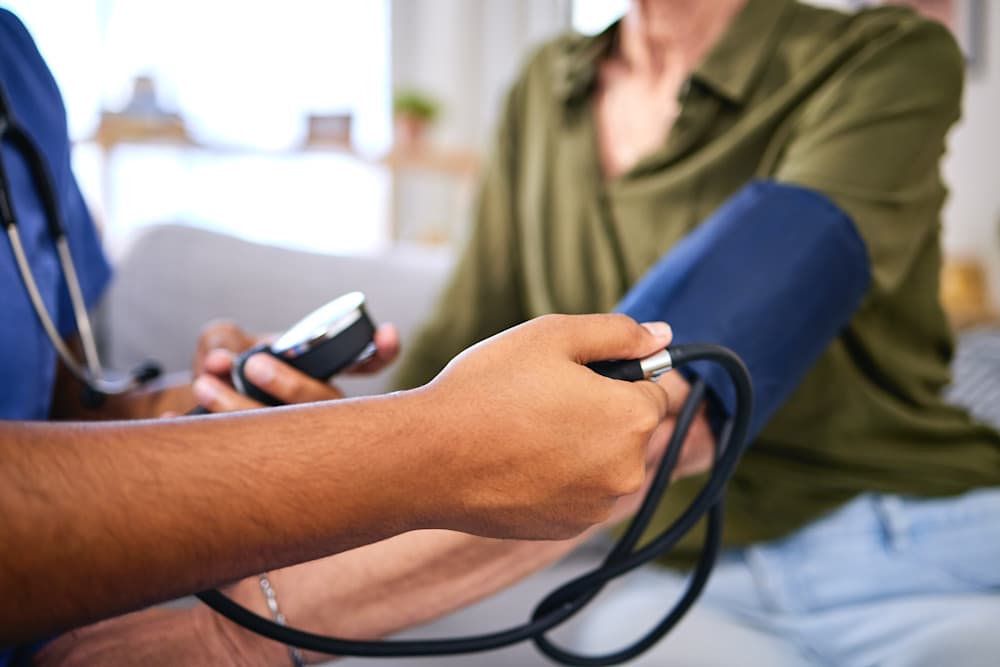Breaking down myths: Common misconceptions about hypertension

6 Minutes

Team Curative

Apr 19, 2025
Hypertension is another term for high blood pressure. This condition is common: it affects 47% of adults, or 116 million people in the US. Though the symptoms of hypertension can be invisible, it contributes to severe medical conditions, including heart disease, stroke, and others.
Though hypertension is common, myths about symptoms and treatments persist. Discover these common myths and learn more about diagnosing, treating, and preventing high blood pressure. Regular health screenings and effective preventive care are key to tracking your blood pressure and providing support as you maintain the healthy habits that will keep hypertension at bay.

What is high blood pressure?
When a provider measures your blood pressure during your regular health screening, they measure the force of blood pushing against blood vessel walls. A blood pressure reading includes two numbers:
Systolic blood pressure is the top number of blood pressure readings. This number measures the pressure on your artery walls when your heart contracts.
Diastolic blood pressure is the bottom number. It measures the pressure on the artery walls between beats, when the heart is relaxed.
The American Heart Association and healthcare providers in the US define high blood pressure as a systolic blood pressure of 130 mmHg or over and/or a diastolic blood pressure of at least 80 mmHg. These measurements are taken in millimeters of mercury (mmHg).
What is the role of health screening in preventing hypertension?
High blood pressure is when the force of blood pushing against your artery walls is consistently too high. Over time, this force damages your arteries. Healthcare providers often call hypertension a “silent killer” because patients typically lack symptoms. You may be unaware that you have high blood pressure even as your arteries are being damaged.
Symptoms of hypertension are often invisible. The only way to know your blood pressure definitively is to have it checked. Your provider will check your blood pressure at your yearly preventive health visits. Because you won’t feel sick or experience symptoms associated with high blood pressure, these regular health screenings can be lifesaving. If your blood pressure check reveals that your numbers are too high, your provider will recommend lifestyle changes or medications to lower your blood pressure. Though you can experience high blood pressure for years without symptoms, some people experience headaches, shortness of breath, and nosebleeds.

What causes high blood pressure?
Healthcare providers agree that a combination of factors typically causes high blood pressure. Common primary causes include:
Unhealthy eating habits, particularly a diet high in sodium
Lack of exercise
Heavy alcohol consumption
Secondary causes associated with high blood pressure include:
Certain medications, including immunosuppressants, NSAIDs, and oral contraceptives
Kidney disease
Obstructive sleep apnea
Primary aldosteronism (Conn’s syndrome)
Recreational drug use (amphetamines and cocaine)
Renal vascular diseases
Tobacco use (smoking, vaping, and smokeless tobacco)
Stress can also increase the likelihood that you will develop high blood pressure. When under stress, the body releases a surge of hormones. These hormones cause the heart to beat faster and blood vessels to narrow. As a result, your blood pressure temporarily increases. Though this may not lead to high blood pressure over the long term, unhealthy reactions to stress do. These reactions may include alcohol or drug use, tobacco use, or increased levels of anxiety. Finding healthy ways to manage stress can help you keep your blood pressure healthy.
Researchers believe that genetics also play a role in high blood pressure. If one or more of your close biological family members have high blood pressure, you are also more likely to have high blood pressure. Healthcare providers will ask for your family history at preventive care visits.

Debunking myths about high blood pressure
Though high blood pressure is very common, many myths surround the condition. Here are a few of the most persistent myths and the truth behind them:
Myth: You can eat what you want as long as you don’t put too much salt on your food. In fact, various processed foods contain high levels of dietary sodium, and regular consumption of these foods can raise blood pressure. These include processed snack foods, cheese, soups, luncheon meats, and soups.
Myth: Drinking coffee can raise blood pressure. In fact, caffeine does not generally raise blood pressure.
Myth: High blood pressure is more common in men than women. In fact, this depends on age. Before age 50, hypertension is more common in men than women. But after menopause, a woman’s risk increases.
Myth: People of all races experience the same risk of high blood pressure. In fact, Black adults have an increased risk of developing hypertension. The reasons for this are multiple and not definitively established, but the statistics are clear.
Myth: Young people don’t need to worry about high blood pressure. In fact, young people can experience hypertension, which can lead to other health problems. Health screenings ensure you know your child’s blood pressure numbers and can address issues if necessary.
Myth: If I have a family history of high blood pressure, there’s nothing I can do to prevent it. In fact, lifestyle changes can reduce your risk.
What are common treatments for hypertension?
When a healthcare provider has established that you have high blood pressure, they can prescribe various solutions. One of these is blood pressure medication. Four classes of blood pressure medications are commonly prescribed:
Angiotensin-converting enzyme (ACE) inhibitors block the production of the angiotensin II hormone, which the body naturally uses to manage blood pressure. When the medicine blocks angiotensin II, your blood vessels don’t narrow.
Angiotensin II receptor blockers (ARBs) block this same hormone from binding to receptors in the blood vessels. They work like ACE inhibitors to prevent blood vessels from narrowing.
Calcium channel blockers prevent calcium from entering the muscle cells of your heart and blood vessels, allowing these vessels to relax.
Diuretics (water or fluid pills) flush excess sodium from your body, reducing the amount of fluid in your blood.
These medications may be prescribed alone or in combination. Some medications have side effects, which a healthcare provider can monitor during preventive care visits.
Lifestyle changes can have a powerful effect on your blood pressure. The Mayo Clinic recommends ten healthy lifestyle habits that can help you keep your blood pressure at healthy levels:
Lose extra weight and watch your waistline.
Exercise regularly.
Eat a healthy diet.
Reduce salt and sodium in your diet.
Limit alcohol.
Quit smoking.
Get adequate sleep.
Make efforts to eliminate stress and cope with stress in healthy ways.
Track your blood pressure at home and get regular preventive care.
Control cholesterol and blood sugar.
Many lifestyle changes require a long-term commitment, and consistency can be challenging. It is essential to have support to maintain these healthy habits. Your family, friends, and preventive care provider can all help hold you accountable and support your journey.
About Curative
Curative is a health plan that employees and employers love for its affordability, engagement, and simplicity. With $0 copays and $0 deductibles, Curative stands apart as a first-of-its-kind plan that eliminates financial barriers to care with guided support. Imagine — a health plan that actually delivers better health.
Curative helps members manage and improve their blood pressure levels through diet guides and medication management. Members can also receive $0 CPAP machines along with sleep studies and a free high-blood pressure monitor.
Learn more here about how Curative’s preventive health offerings can help you maintain healthy blood pressure and support you in your overall health journey.
To see all disclaimers, please view here.
Resources
American Heart Association. (2025). Understanding Blood Pressure Readings. https://www.heart.org/en/health-topics/high-blood-pressure/understanding-blood-pressure-readings
Cleveland Clinic. (2025). High Blood Pressure (Hypertension). https://my.clevelandclinic.org/health/diseases/4314-hypertension-high-blood-pressure
Donvito, T. (2024, Aug 9). 10 Blood Pressure Myths and Facts You Need to Know. Keck Medicine of USC. https://www.keckmedicine.org/blog/10-blood-pressure-myths-and-facts/
Harvard Health Publishing. (2025, Jan 3). 7 Ways to Reduce Stress and Keep Blood Pressure Down. https://www.heart.org/en/health-topics/high-blood-pressure/understanding-blood-pressure-readings
Mayo Clinic Staff. (2025). 10 Ways to Control High Blood Pressure Without Medication. Mayo Clinic.https://www.mayoclinic.org/diseases-conditions/high-blood-pressure/in-depth/high-blood-pressure/art-20046974
Sign up for our Newsletter
Table of Contents
What is high blood pressure?
What is the role of health screening in preventing hypertension?
What causes high blood pressure?
Debunking myths about high blood pressure
What are common treatments for hypertension?
About Curative
Resources








